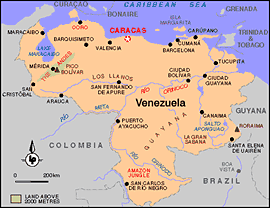 Venezuela learns to diversify after turbulent political times Venezuela learns to diversify after turbulent political times |
Since his landslide victory in 1998, President Hugo Chavez has managed to reign in rampant inflation and trim the nation's fiscal deficit: a hangover from years of mismanagement and corruption. With another year of growth on the way and oil revenues at 10-year highs, Venezuela says that its potential goes well beyond the traditional image of oil and beauty queens.

In 1998 eyebrows were raised in the local and international business community when President Hugo Chavez, a former army colonel, who led a failed coup in 1992, won the presidency.
His left-leaning rhetoric and calls for a more equal distribution of wealth, scared many who believed it would lead to a tough socialist government eager for greater state control.
Two years later, those fears have been laid to rest with the government deregulating the gas, electricity and telecoms sectors as well as making efforts to diversify the economy away from oil dependency by fostering growth in tourism and agriculture.

"As a country we can now offer stability and demonstrate that we are actively embracing a market economy. It is a change of government but with a social ingredient," Jose Rojas, Venezuela's Finance Minister says.
Twice the size of California, the nation of 24 million is now heading towards a second year of economic growth and slowing inflation.
Inflation fell from 20% to 13.4% in 1999, and GDP grew 3.3% after a contraction of 7.2% in 1999, Rojas says.
Venezuela has also made efforts to streamline public finances and the treasury, as well as improve soured relations with International Monetary Fund (IMF).
"It takes time to mend fences," the minister says. "And we are doing just that."
A new constitution, approved by popular referendum in late-1999 requires that the government lays out special measures and incentives to boost tourism and agriculture, while there is also a greater emphasis on decentralization, giving the nation's 23 state Governors greater independence from Caracas.
Taming inflation has been a major success for the
government in 2000. It careered dangerously out
of control in the mid- nineties and topped 30% in
1999, but will finish well within the 12-15% band
set by the government for 2000. |
"Our economic policies have given us a platform for sustainable growth in the future. Investors that want to enter the market will enjoy relatively low inflation, monetary stability and strong international reserves," says Jorge Giordani, Venezuela's Planning Minister and and key adviser to President Chavez.

Critics of the new government say that the bloated public sector pay roll of one million workers needs to be cut. President Chavez counters that streamlining ministries and training workers in computer technology will cut down on red tape without increasing unemployment.
Throughout 1999 and 2000 Ministries have been merged and the endless list of inefficient government funded agricultural, industrial and regional cooperatives have been greatly reduced.
The over-valuation of Venezuela's local currency, the Bolivar is also a private sector groan. Financial analysts and ratings agencies put over-valuation at 30-50% and local business complains that it damages exports. The government counters that the fixed currency band system provides investors with a secure, fixed Bolivar rate allowing them to calculate what their costs will be.

We feel confident about the current changes in Venezuela, explains Spanish Ambassador, Miguel Angel Fernandez.There are risks but there is huge potential and many people are waiting for the right timing to enter the market.
The government says that tax breaks and export bonuses set off the costs of the over-valuation, which the government estimates is around 10%.
Recognizing the fluctuations in world oil prices that have wreaked fiscal havoc the economy in recent decades, the Macro-economic Stabilization fund (FIEM) which gathers oil revenues over $15 per barrel, will have saved $10 billion by the end of 2001.
Nonetheless global ratings agencies continue to give the country one of the highest country risk ratings in Latin America. Vice President Rodriguez expects this risk to drop in 2001, helped by steady fiscal indicators and the lessening of political tensions. |

